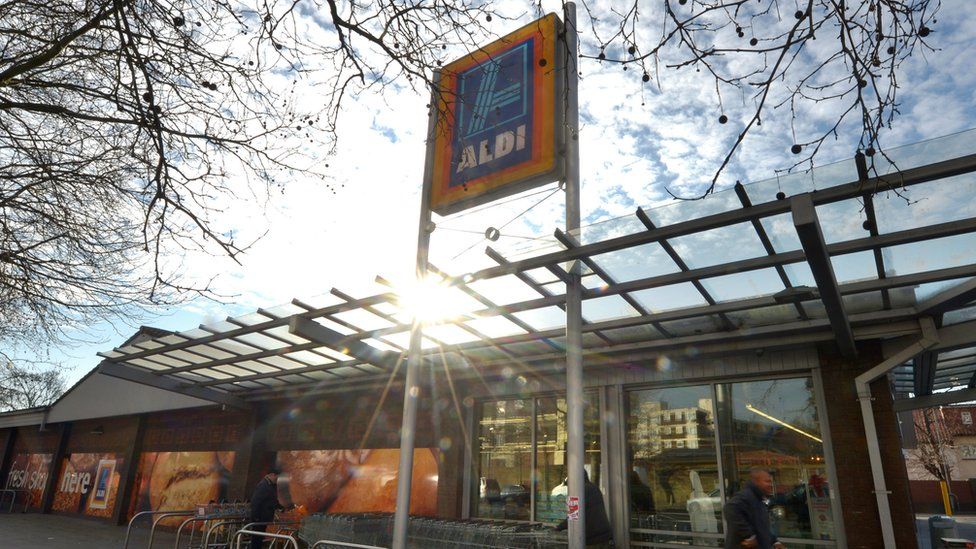Aldi reports record sales but profits drop
- Published

Discount supermarket Aldi has reported record sales in the UK and Ireland for 2015 and says it will invest £300m in store revamps, but profits have been hit by the supermarket price war.
Sales rose 12% year-on-year to £7.7bn for the year to 31 December 2015.
But operating profits fell 1.8% to £255.6m which it attributed to "continued investment in prices".
Aldi said it would invest more in fresh produce, alcoholic drinks, ready meals and refurbish 100 stores.
Chief executive Matthew Barnes said the move was the result of a "listening exercise" involving more than 50,000 shoppers.
Expansion plans
The German-owned firm added that it would open 70 new stores in the UK next year as part of plans to increase the number of its outlets from 659 to 1,000 by 2022.
Aldi said it had doubled revenue in just three years and attracted 761,000 new customers in the UK. Its share of the UK grocery market now stands at 6.2%.
Aldi added that its future investment plans were unaffected by the UK's decision to leave the EU.
The retailer is planning to increase the size of its two existing distribution sites, open a new one in Cardiff and re-develop its UK head office in Warwickshire.
Analysis, Emma Simpson, business correspondent
Aldi's growth story is remarkable but the price war is eating into its profits. It says its cut prices on 30% of its products, to maintain the price gap with its bigger rivals who have sharpened their offer.
Tesco's new farm brands range, for instance, has given Aldi a run for its money. So how far is Aldi prepared to go to win on price?
Its UK boss, Matthew Barnes, repeatedly said this morning that Aldi would invest "whatever" it takes to retain its position. He even hinted that Aldi would tolerate losses in order to win long term.
In other words, price is a battle that that the big four grocers simply won't be able to win.
And, for now at least, Aldi continues to set the tempo.
"There's no reason why there can't be an Aldi in every town and city," says Matthew Barnes.
The march of the discounters shows no sign of abating any time soon.
Aldi said it had increased the number of products it sourced from British suppliers to 77% from 69% in 2014.
Mr Barnes said Aldi would continue to concentrate on maintaining "a significant price advantage over our competitors".
Market share
The majority of consumers in the UK still shop at the big four supermarket chains - Tesco, Asda, Sainsbury's and Morrisons.
But the influence of Aldi and Lidl's low-cost model has been huge and they have cut into the big four's share of the market.
They remain Britain's fastest growing supermarkets with a combined market share of 10.8%, according to recent industry data.
Their presence has sparked a prolonged supermarket price war and changed consumers' attitudes towards no-frills shopping, eroding snobbery towards discount retailers.
Neil Wilson, market analyst at ETX Capital, said: "What's good news for Aldi is bad for the Big Four supermarkets.
"What will worry the boards of those firms the most is the loss of market share - Aldi is enticing more and more customers away from the likes of Tesco and Sainsbury.
"And with bold plans to have 1,000 stores in the UK by 2022 it's hard to see the retailer not taking more market share. The question is how much."
- Published15 September 2016
- Published11 September 2016
- Published9 September 2016
- Published5 September 2016